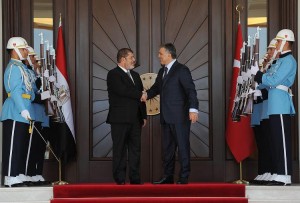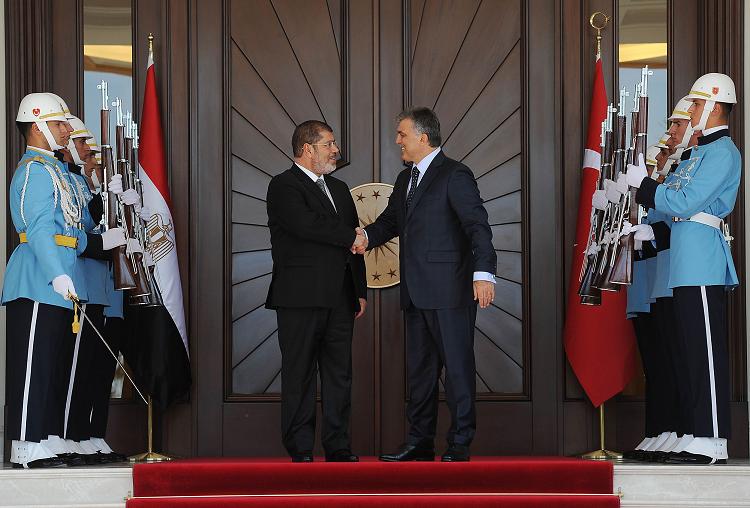
AFP PHOTO / MUSTAFA OZTARTAN
President Mohamed Morsy and Turkish Prime Minister Recep Tayyip Erdoğan met on Sunday to discuss the partnership between Egypt and Turkey, one that has the potential to influence the future of the entire Middle East.
Top of the agenda for Morsy’s Ankara visit is the economy, with Erdoğan’s ruling Justice and Development Party (AKP) likely to be seen as a role model for the president.
“Morsy has applied the Turkish model to both his campaign and his domestic policy,” said Radha Allam of the Al-Ahram Center for Political & Strategic Studies. She stated that this trip is to show that Egypt is going to be like Turkey and to tie the two countries together in the eyes of the world.
Morsy’s visit coincides with the AKP party congress. The Anadolu state news agency reported that Erdoğan spoke to a stadium packed with thousands of supporters and dignitaries. The prime minister spoke about Turkey’s economic progress, continued civilian rule and battles with Kurdish rebels. Morsy was joined by leaders from Kyrgyzstan, Iraq, Sudan, and Gaza.
“Morsy feels a great similarity between his party and the ruling party in Turkey,” said Cairo University professor Alia El-Mahdy. “Turkey could be a strong ally, both a political and economic ally.”
Morsy gave a speech to the Federation of Chambers of Commerce in Ankara, where more than 600 businessmen from the two countries attended.
El-Mahdy said the two countries “have cooperated since Mubarak’s time, we have had a trade agreement with Turkey to facilitate the flow of imports and exports, as well as capital. We need all kinds of support from different countries. Just as Morsy went to China, he went to Europe, and the USA, he is trying to find ways and means to support the economy by attracting investors to Egypt.”
Metin Turan, secretary general for the Association of Turkish and Egyptian Businessmen, agreed. “Turkish investors at the time of the revolution closed down their factories but did not leave Egypt,” said Turan. “Now Turkish investment in Egypt is flourishing again.”
Turan said that Turkey is already invested in Alexandria, 10th of Ramadan, 6th of October, and Sadat City. He said Turkish businesses employ around 50,000 Egyptian workers. “New investors are seeking to open magazines, warehouses, and new supermarkets,” said Turan, adding that “Turkish investors are doing a study on how to expand in the Egyptian market.”
The Egyptian and Turkish leadership also discussed regional events on Sunday. “Morsy is eager to get involved in a new and different way with regional affairs,” said Allam. “Three weeks ago Morsy began to work with regional powers to get a new agreement on Syria. He is trying to get regional cooperation, not just international. I am not sure if this could be useful, but it announces a new role for Egypt in the region.”
Morsy had proposed a four party plan for a resolution to the Syrian crisis that would see leadership coming solely from regional powers: namely Egypt, Turkey, Iran, and Saudi Arabia. Within this framework the foreign ministers of Egypt, Turkey, and Iran met recently in Cairo. Noticeably absent was representation from Saudi Arabia. “One can guess that Iranian participation may not be welcomed by the Saudi crown, which has far more drastic views with regard to the Syrian crisis and [Syrian President Bashar] Al-Assad’s regime than the Iranians,” said Filippo Dionigi, a member of the British Society for Middle Eastern Studies.
In fact, it was another Gulf state that stressed the urgency of the Syrian crisis this week. At the UN general assembly, the Emir of Qatar, Sheikh Hamad bin Khalifa Al-Thani, seemed to call for Arab military intervention in Syria. He stated that initiatives up to this point have been in vain and offered Arab forces being deployed in Lebanon as a precedent for successful military intervention in the region. The Emir stated, “I think that it is better for the Arab countries themselves to interfere out of their national, humanitarian, political and military duties and do what is necessary to stop the bloodshed in Syria.”
Sunday’s meeting in Ankara will be followed by a meeting in Cairo next month. Turan said the October meeting will see Erdoğan signing a strategic agreement to secure economic, military, and industrial cooperation between the two countries. “Erdoğan will be accompanied by about 11 ministers and it will be important for Egypt,” said Turan.




